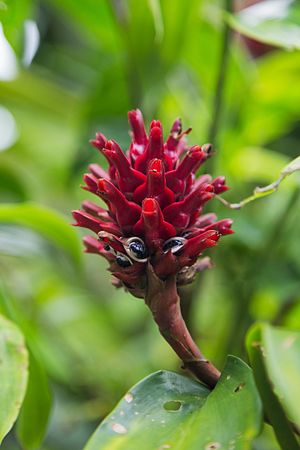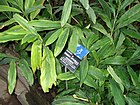Note: This is a project under development. The articles on this wiki are just being initiated and broadly incomplete. You can Help creating new pages.
Difference between revisions of "Zingiber officinale"
(→Uses) |
|||
| Line 2: | Line 2: | ||
'''Zingiber officinale''' is a slender, erect, herbaceous perennial plant growing from 30 - 150cm tall. It has a robust, branched rhizome that is borne horizontally near the soil surface, bearing leafy shoots close together. | '''Zingiber officinale''' is a slender, erect, herbaceous perennial plant growing from 30 - 150cm tall. It has a robust, branched rhizome that is borne horizontally near the soil surface, bearing leafy shoots close together. | ||
==Uses== | ==Uses== | ||
| − | {{Uses|Indigestion}}, {{Uses|Nausea}}, {{Uses|Vomiting}}, {{Uses|Spasms}}, {{Uses|Motion sickness}}, {{Uses|Colic}}, {{Uses|Abdominal chills}}, {{Uses|Colds}}, {{Uses|Coughs}}, {{Uses|Influenza | + | {{Uses|Indigestion}}, {{Uses|Nausea}}, {{Uses|Vomiting}}, {{Uses|Spasms}}, {{Uses|Motion sickness}}, {{Uses|Colic}}, {{Uses|Abdominal chills}}, {{Uses|Colds}}, {{Uses|Coughs}}, {{Uses|Influenza}}.<ref name="Uses"/> |
==Parts Used== | ==Parts Used== | ||
Revision as of 12:50, 18 August 2021
Zingiber officinale is a slender, erect, herbaceous perennial plant growing from 30 - 150cm tall. It has a robust, branched rhizome that is borne horizontally near the soil surface, bearing leafy shoots close together.
Contents
- 1 Uses
- 2 Parts Used
- 3 Chemical Composition
- 4 Common names
- 5 Properties
- 6 Habit
- 7 Identification
- 8 List of Ayurvedic medicine in which the herb is used
- 9 Where to get the saplings
- 10 Mode of Propagation
- 11 How to plant/cultivate
- 12 Commonly seen growing in areas
- 13 Photo Gallery
- 14 References
- 15 External Links
Uses
Indigestion, Nausea, Vomiting, Spasms, Motion sickness, Colic, Abdominal chills, Colds, Coughs, Influenza.[1]
Parts Used
Chemical Composition
It contains steroids, paradol, gingerols, gingerones and shogaols, shogaol etc.[2]
Common names
| Language | Common name |
|---|---|
| Kannada | Alla, Shunthi |
| Hindi | Adrak |
| Malayalam | Inchi, Enchi |
| Tamil | Ingee, Inji |
| Telugu | Allam, Allamu |
| Marathi | Alha, Aale |
| Gujarathi | Adu |
| Punjabi | |
| Kashmiri | |
| Sanskrit | |
| English | Ginger |
Properties
Reference: Dravya - Substance, Rasa - Taste, Guna - Qualities, Veerya - Potency, Vipaka - Post-digesion effect, Karma - Pharmacological activity, Prabhava - Therepeutics.
Dravya
Rasa
Guna
Veerya
Vipaka
Karma
Prabhava
Habit
Identification
Leaf
| Kind | Shape | Feature |
|---|---|---|
Flower
| Type | Size | Color and composition | Stamen | More information |
|---|---|---|---|---|
| {{{5}}} |
Fruit
| Type | Size | Mass | Appearance | Seeds | More information |
|---|---|---|---|---|---|
Other features
List of Ayurvedic medicine in which the herb is used
Where to get the saplings
Mode of Propagation
How to plant/cultivate
A plant of the moist to wet tropics, where it is found at elevations up to 1,900 metres. It grows best in areas where annual daytime temperatures are within the range 19 - 29°c, but can tolerate 13 - 35°c.[5]
Commonly seen growing in areas
[[:Category:Herbs that are commonly seen in the region of |]], [[:Category:Herbs that are commonly seen in the region of |]], [[:Category:Herbs that are commonly seen in the region of |]], [[:Category:Herbs that are commonly seen in the region of |]], [[:Category:Herbs that are commonly seen in the region of |]].
Photo Gallery
References
- ↑ Indian Medicinal Plants by C.P.Khare
- ↑ Chemical constituents
- ↑ Common names
- ↑ [Morphology]
- ↑ Cultivation
External Links
- Ayurvedic Herbs known to be helpful to treat Indigestion
- Ayurvedic Herbs known to be helpful to treat Nausea
- Ayurvedic Herbs known to be helpful to treat Vomiting
- Ayurvedic Herbs known to be helpful to treat Spasms
- Ayurvedic Herbs known to be helpful to treat Motion sickness
- Ayurvedic Herbs known to be helpful to treat Colic
- Ayurvedic Herbs known to be helpful to treat Abdominal chills
- Ayurvedic Herbs known to be helpful to treat Colds
- Ayurvedic Herbs known to be helpful to treat Coughs
- Ayurvedic Herbs known to be helpful to treat Influenza
- Herbs with Young rhizomes used in medicine
- Herbs with Roots used in medicine
- Herbs with common name in Kannada
- Herbs with common name in Hindi
- Herbs with common name in Malayalam
- Herbs with common name in Tamil
- Herbs with common name in Telugu
- Herbs with common name in Marathi
- Herbs with common name in Gujarathi
- Herbs with common name in English
- Habit - Perennial
- Index of Plants which can be propagated by Seeds
- Herbs that are commonly seen in the region of
- Herbs







